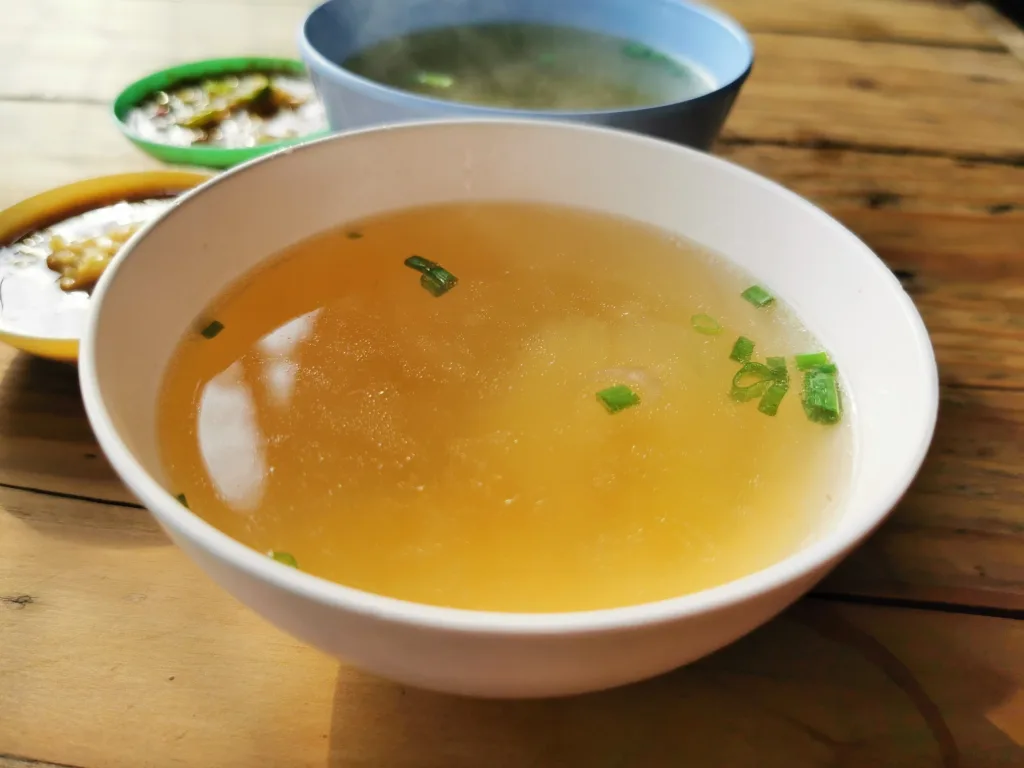Have you ever wondered how long vegetable broth can last past the expiration date? Have you ever been concerned about the safety of using expired vegetable broth? In this article, we will discuss how long vegetable broth can last past the expiration date, as well as why it is important to know this information. We will also provide tips on storage methods to help prolong the shelf life of your vegetable broth.
Once the expiration date passes, vegetable broth should not be consumed. The shelf life of vegetable broth past its expiration date is not safe to consume and could lead to foodborne illness.
Ingredients
One of the key factors that affects the shelf life of vegetable broth is the ingredients used in its preparation. Depending on the ingredients used, vegetable broths can have a shelf-life of up to six months. Common ingredients used in vegetable broth include vegetables such as onions, carrots, celery, and garlic; herbs and spices such as bay leaves, oregano, thyme, and parsley; and acids such as white wine vinegar or lemon juice. If these ingredients are of high quality and freshness, then the shelf life of vegetable broth can be extended.
Storage Conditions
Another important factor that affects the shelf life of vegetable broth is how it is stored. Vegetable broth should be kept in an airtight container at a temperature between 32-40°F (0-4°C). If stored at a higher temperature or exposed to air or light for too long, then its shelf life can be drastically reduced. It is also important to store vegetable broth away from heat sources such as ovens or stovetops.
Preservatives
The addition of preservatives can also affect the shelf life of vegetable broth. Common preservatives used in vegetable broths include sodium benzoate and potassium sorbate which help preserve the freshness and flavour of the broth for longer periods of time. However, it is important to note that preservatives may add an off-flavour to the broth so it should be added sparingly.
Expiration Date
Finally, it is important to take note of the expiration date on any packaged or canned vegetable broths. Most packaged or canned broths have an expiration date that indicates when they should no longer be consumed due to safety reasons. It is best to check this date before consuming any type of pre-packaged or canned product.
Storing Vegetable Broth After Expiration Date
Vegetable broth is a popular ingredient in many recipes and is a great way to add flavor to a variety of dishes. Unfortunately, it has a limited shelf life and can spoil quickly if not properly stored. So, what should you do if your vegetable broth has passed its expiration date?
The best answer is to throw it away. While it may still be safe to eat, the flavor and texture of the broth will be significantly compromised. It’s also possible that the broth could contain harmful bacteria or other contaminants that could make you sick.
If you’d like to extend the shelf life of your vegetable broth, try freezing it. This will help retard spoilage and ensure that the liquid stays fresh for up to six months. To freeze your broth, place it in an airtight container or ziplock bag before placing it in the freezer.
You can also extend the shelf life of vegetable broth by refrigerating it for up to one week after opening. Again, make sure to store your broth in an airtight container or ziplock bag before refrigerating it. When reheating your refrigerated broth, make sure that it reaches an internal temperature of 165°F (74°C) before consuming.
It’s important to remember that while storing vegetable broth after its expiration date may help extend its shelf life, there’s no guarantee that it’s still safe to consume. Discard any expired or spoiled broth immediately and always use good food safety practices when preparing meals with perishable ingredients like vegetable broth.
Signs Of Spoiled Vegetable Broth
When it comes to the signs of spoiled vegetable broth, there are several indicators to look for. One of the most common signs is a sour smell coming from the broth. This means that the vegetables have gone bad and should not be consumed. Another indication is a change in color, as off-white or grey coloring may be an indication of spoilage. Additionally, if the broth has a slimy or oily texture, this can also indicate that it is spoiled. Finally, if there are any visible mold growths in the broth, this is an obvious sign that it is no longer safe to consume.
It’s important to note that these signs may not always be present when a vegetable broth has gone bad. In some cases, the flavor of the broth may start to become more unpleasant even though there are no visible signs of spoilage. Therefore, it’s important to always check with a food safety expert whenever you suspect that your vegetable broth may have gone bad.

Is It Safe To Eat Expired Vegetable Broth?
Eating expired vegetable broth is generally not recommended, as it may contain bacteria or other contaminants that can cause food poisoning. Even if the broth has been properly stored, the expiration date indicates when the broth is no longer safe to consume. Vegetable broth may contain ingredients that can spoil quickly and become unsafe to eat, even if it has been refrigerated.
It is important to note that vegetable broth is a perishable product and should be consumed before the expiration date passes. If the vegetable broth is past its expiration date, it should not be eaten. The best way to ensure safety is to check the expiration date before consuming any product and throw away expired products.
When it comes to storing vegetable broth, it should be kept in an airtight container in the refrigerator for up to five days. If needed, frozen vegetable broth can also be stored for up to three months in a freezer-safe container.
If you suspect that you have consumed expired vegetable broth, it is important to seek medical attention if you experience any symptoms of food poisoning such as nausea, vomiting, diarrhea, abdominal pain or fever. These symptoms may indicate that you have contracted foodborne illness from consuming contaminated food or drink.
In summary, eating expired vegetable broth is not recommended as it may contain bacteria or other contaminants that could cause foodborne illness. It is best to check the expiration date on all products before consuming them and discard any products past their expiration dates.
Tips For Keeping Vegetable Broth Fresh Longer
Vegetable broth is a great way to add flavor and nutrition to your favorite dishes, but it can go bad quickly if not stored properly. Fortunately, there are a few simple tips for keeping vegetable broth fresh longer. Here are some of the best practices for extending the shelf life of your vegetable broth.
First, it’s important to store vegetable broth in airtight containers. Glass jars or plastic containers with locking lids work best, as they provide an extra layer of protection against air and moisture. Be sure to tightly seal the lid after each use to keep the broth as fresh as possible.
It’s also important to store vegetable broth in the refrigerator or freezer. Refrigerated vegetable broth should be used within four days, while frozen broth can last up to three months. For optimal freshness, try freezing individual servings in small containers or ice cube trays so that you only thaw out what you need at any given time.
Finally, be sure to give your vegetable broth a good sniff before using it. If it has developed an off odor or taste, it’s best to discard it and make a fresh batch instead. With these tips for keeping vegetable broth fresh longer, you can enjoy its delicious flavor for weeks or months!
Use-By Date & Best-Before Date On Vegetable Broth
The use-by date and best-before date on vegetable broth indicate when the product is no longer safe to consume. The use-by date is the date after which the broth should not be consumed, as it has gone past its peak quality and potentially may contain bacteria that can cause food poisoning. The best-before date, on the other hand, indicates when the quality of the product may start to decline, but it is still safe to consume. It is important to note that both dates are based on estimates and are not always 100% accurate. It is best to always check for signs of spoilage before consuming any vegetable broth, such as an off smell or discolored liquid.
When a vegetable broth has surpassed its use-by date, it should be discarded immediately as consuming it could lead to food poisoning. If a broth has passed its best-before date, it does not necessarily mean that it is no longer safe for consumption; however, its flavor may have changed slightly and its nutritional value may have decreased slightly. If you want to get the highest quality from your vegetable broth, then make sure you check both the use-by and best-before dates before purchasing it or consuming it.

Conclusion
Vegetable broth can be a nutritious and versatile addition to any meal. It is important to pay attention to the expiration date on the package, however, since vegetable broth will not last indefinitely. The shelf life of an unopened package of vegetable broth can range from 3-12 months when stored properly in a cool, dry place. Once opened, vegetable broth will last for about 5 days in the refrigerator if covered tightly and stored at or below 40°F. If you’re unsure if your vegetable broth is still good, it is best to discard it as it may contain harmful bacteria that can cause food poisoning.
Enjoying vegetable broth is easy when you take the necessary precautions to ensure it is safe and still fresh. Paying attention to expiration dates and storing the broth correctly in a cool, dry place are essential steps that should never be overlooked. With these simple steps, you can safely add some delicious flavor and nutrition to your meals with vegetable broth for months to come!
